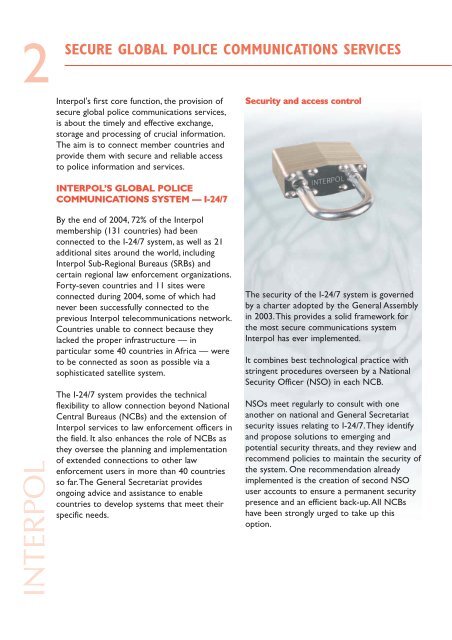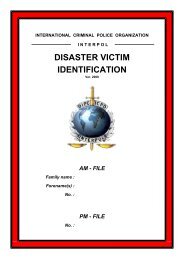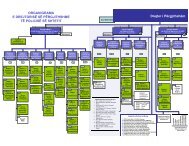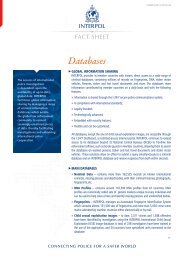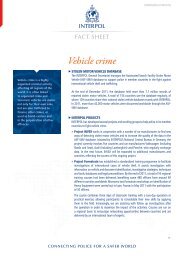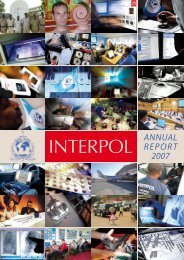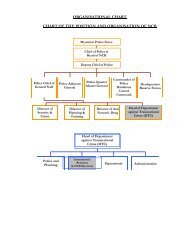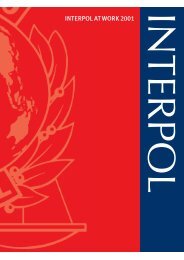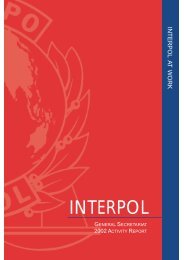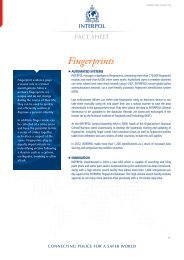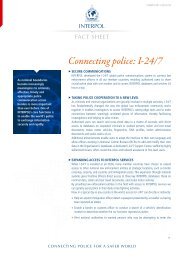2004 - Interpol
2004 - Interpol
2004 - Interpol
You also want an ePaper? Increase the reach of your titles
YUMPU automatically turns print PDFs into web optimized ePapers that Google loves.
2<br />
SECURE GLOBAL POLICE COMMUNICATIONS SERVICES<br />
<strong>Interpol</strong>'s first core function, the provision of<br />
secure global police communications services,<br />
is about the timely and effective exchange,<br />
storage and processing of crucial information.<br />
The aim is to connect member countries and<br />
provide them with secure and reliable access<br />
to police information and services.<br />
Security and access control<br />
INTERPOL’S GLOBAL POLICE<br />
COMMUNICATIONS SYSTEM — I-24/7<br />
INTERPOL<br />
By the end of <strong>2004</strong>, 72% of the <strong>Interpol</strong><br />
membership (131 countries) had been<br />
connected to the I-24/7 system, as well as 21<br />
additional sites around the world, including<br />
<strong>Interpol</strong> Sub-Regional Bureaus (SRBs) and<br />
certain regional law enforcement organizations.<br />
Forty-seven countries and 11 sites were<br />
connected during <strong>2004</strong>, some of which had<br />
never been successfully connected to the<br />
previous <strong>Interpol</strong> telecommunications network.<br />
Countries unable to connect because they<br />
lacked the proper infrastructure — in<br />
particular some 40 countries in Africa — were<br />
to be connected as soon as possible via a<br />
sophisticated satellite system.<br />
The I-24/7 system provides the technical<br />
flexibility to allow connection beyond National<br />
Central Bureaus (NCBs) and the extension of<br />
<strong>Interpol</strong> services to law enforcement officers in<br />
the field. It also enhances the role of NCBs as<br />
they oversee the planning and implementation<br />
of extended connections to other law<br />
enforcement users in more than 40 countries<br />
so far.The General Secretariat provides<br />
ongoing advice and assistance to enable<br />
countries to develop systems that meet their<br />
specific needs.<br />
The security of the I-24/7 system is governed<br />
by a charter adopted by the General Assembly<br />
in 2003.This provides a solid framework for<br />
the most secure communications system<br />
<strong>Interpol</strong> has ever implemented.<br />
It combines best technological practice with<br />
stringent procedures overseen by a National<br />
Security Officer (NSO) in each NCB.<br />
NSOs meet regularly to consult with one<br />
another on national and General Secretariat<br />
security issues relating to I-24/7.They identify<br />
and propose solutions to emerging and<br />
potential security threats, and they review and<br />
recommend policies to maintain the security of<br />
the system. One recommendation already<br />
implemented is the creation of second NSO<br />
user accounts to ensure a permanent security<br />
presence and an efficient back-up.All NCBs<br />
have been strongly urged to take up this<br />
option.


